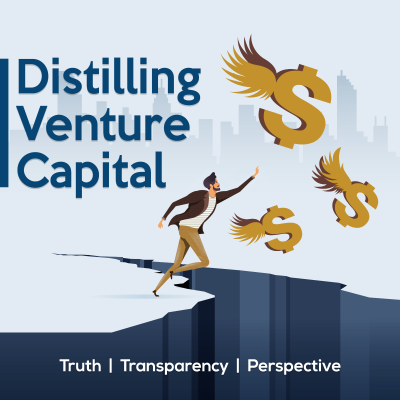
Distilling Venture Capital
Podcast de Bill Griesinger
Disfruta 90 días gratis
4,99 € / mes después de la prueba.Cancela cuando quieras.

Más de 1 millón de oyentes
Podimo te va a encantar, y no sólo a ti
Valorado con 4,7 en la App Store
Acerca de Distilling Venture Capital
Host Bill Griesinger brings an informed, unbiased and unique historical perspective to the venture capital and high-tech world. Drawing on over 20 years in venture finance, working with tech companies and venture capitalists, he offers an unfiltered and transparent view of the venture capital & high-tech universe.
Todos los episodios
50 episodiosUNICORN MANIA, The Real Facts About Post-Money Valuation Post-Money Valuation; The Facts * It is absolutely NOT the market capitalization or market value of a tech unicorn company; * PM Valuation completely ignores all the prices paid, preferences, and rights granted, for ALL prior rounds – a major flaw and a farce; * Thus, a completely distorted picture of value is created by actually assuming that all of these past preferred rounds of equity, plus common, are all magically worth the same price as the round just completed. This is insanity; * To make matters worse, The derivation of the PM Valuation is cloaked in secrecy – it´s a black box - you don´t get to see the calculation! * Remember, from the Stanford Study, ALL 135 Unicorn companies evaluated were overvalued using the PM Valuation AND, 65 lose their Unicorn status! * This is a ‘Houston-we-have-a-problem’ moment. If these statistics aren’t an indicator that something is terribly wrong with the PM Valuation...well…then you are in Unicorn land. A Unicorn Index Fund is a Sham Given the above facts, the concept of a Unicorn Index, then, is a sham based on this faulty method of valuation. The indexes, in fact, do not have visibility into the requisite information and data actually needed to return a market value or market capitalization (i.e., financial statements). That´s why they use the inappropriate and discredited PM Valuation and then try to sell it to you as some rigorous and proprietary methodology. Complete BS. * Since these index funds have very limited information in these private companies (again, no fin. statements), they are trying to triangulate a valuation from incomplete information and back-of-the-envelope approach. * It turns out, based on the research, the PM Valuation is a very bad proxy for determining value. It cannot even be considered a derivative of value. It’s far worse. At a minimum, a derivative security actually derives its underlying value from another asset or group of assets * PM Valuation is far riskier and worse than a derivative because there are well-documented, glaring flaws in the methodology; that all prior rounds with different economics are suddenly worth the same as the last round. It’s messed up and it’s improper, as the Study indicates. * In fact, let me let you in on a key piece of information, a key fact: I’ve known about the concept of PM valuation for more than 20 years, during my time as a venture debt lender. The PM valuation was never intended to be used for this purpose (trying to determine a market value for private companies). * EXPLAIN: In 90% to 95% of all the deals, loans we did for VC-backed tech companies, they typically had to raise an additional round or two of capital before we were paid out on the loan. When they raised a new round, the Loan & Sec. Agr. required full reporting. And, Many times company mgt and investors would tell us the PM valuation after this round was X. * We knew how it was calculated and always knew this was not the real market value for the company, b/c of all the terms and conditions of prior rounds of capital. It was always considered a rough, back of the envelope way to look at the company as a very rough approximation of perhaps its future potential value – but in no way did it represent its market value. The idea that index funds, the financial press, and the analytics companies have been trying, for years now, to use this as a representation of value is insane and it’s fraudulent. Btw, Why would anyone invest in an index fund that can´t provide investors with a true picture of value? Any index fund should be required, and investors should demand, full disclosure of the valuation methodology. One would think disclosing your valuation methodology would be a strength, a positive, to show investors you do have rigor in your analysis and determination of value. Transparency should be an asset. Instead, these so-called index funds use stealth because they don´t want you to know that they don´t really have visibility and the tools normally utilized to actually determine real market value for these private tech firms. Why the secrecy and black-box approach if the index funds are asking investors to pony-up vast sums of money to get exposure to private tech company deals? The risks of a private, early-stage technology company are already significantly high enough; and their performance is not proven nor is it disclosed. To gain exposure to this high-risk asset category via an index fund with a completely improper, bogus notion of value is insane. Stay Far Away from any Index of Unicorns So, let´s understand what is really going on here. The facts are these regarding any index comprised of so-called Unicorn tech companies. They possess none of the following key pieces of financial statement information necessary and normally used to properly value a firm: * Firm’s Actual Revenue and its revenue run rate. Thus, no sense of what aggregate monthly and annual revenues are AND, the growth rate of revenue month-over-month; i.e. How fast are revenues growing? * More importantly, no sense of a firm’s gross margins and net operating margins – Is there a path to profitability anywhere in the future? Is the firm even generating positive or meaningful gross margins? A firm’s gross margins reflect basic survivability? * Firm’s Performance to Plan or against the monthly Forecast; * Firm’s monthly cash burn rate; to understand when they run out of cash, in number of months; to ascertain when they need to raise another round of capital from investors Each of the above financial metrics would normally be used to value a firm and measure its financial health and trajectory. These so-called index funds do not have access to any of this information and therefore operate in a vacuum when it comes to relying on real financial metrics normally used to value a company. Investors should be informed as to just how flimsy and flawed these valuations are based on the PM Valuation. The Stanford Study conclusively proves there is a serious problem with the PM Valuation methodology. Further, the Study has developed a methodology that works and clearly demonstrates how to calculate a value for these private tech firms.
Tech Unicorn Valuations are Fake Introduction * Welcome to Distilling Venture Capital. I am your host, Bill Griesinger * Distilling VC is a visionary podcast that provides an insightful and informed view of the key trends affecting the VC and tech startup world. My mission is to cut through and go beyond the hype that tends to dominate the tech landscape. And provide you with information you can use. * It is your podcast for Fintech, DeFi, Blockchain and smart contracts, digital banking and all the frontier Web 3 technologies changing the financial landscape globally. Hello everyone – it´s been a couple of months since my last podcast episode – I took some time off...It´s great to be back with you again. After some thought, consideration and a couple defining events, and an announcement by Pitchbook, one of the so called data analytics firms in the VC space, I decided it was imperative that I do an episode in my Unicorn Mania series. I´ll fill you in on the PB announcement I am referring to in a moment – it´s insane! Before we jump into the episode though, I wanted to pay recognition and acknowledgement to a wonderful Brazilian singer and artist, Gal Costa. My intro music and exit music is Aquarela do Brasil by Gal Costa. Gal Costa passed away on Nov. 9, 2021. A makpr talent in Brazil, I thoroughly enjoyed her music. She will be missed. So, let´s jump into this edition of Unicorn Mania: If you´ve followed this podcast in the past, you are aware that in the UnicornMania series I highlight the largely fake, deceptive valuations of VC-backed private technology companies – Which are Fondly called Unicorns...Isn´t that cute? For background, I refer you to my first episode in the UnicornMania series, March of 2020. Episodes 5 and 6 also deal with this twisted freak show perpetrated by VCs, the tech & financial press and others that engage in all of this Unicorn nonsense. I encourage you to go back to Episode 1 for insights and valuable background information as to why I categorically state and prove that tech Unicorns, a VC-backed tech company allegedly with a $1B or more valuation, are indeed mostly fake… Let´s start off with some levity and have a little fun, shall we, at the expense of Sil. Valley VCs? I read this a couple years ago in a CrunchBase piece; There´s an old joke about a new bar in Sil. Valley. On opening day, 6,000 people showed up. No one buys a drink. The business is declared a roaring success! [This joke will hopefully make perfect sense by the time we finish this episode. Only in SV culture would the above be considered a success! In Sil. Valley, comedy often becomes reality To briefly review, let´s start with some basics I will get into in this episode: * So, as I just mentioned, the definition of this tech unicorn we hear so much about is: A private VC-backed tech company with an alleged valuation of $1B or more; I say allegedly b/c these valuations are largely fake; I´ll demonstrate that with conclusive evidence in just a moment; * VCs and others arrive at this distorted value using a completely improper, simplistic method known as the Post Money Valuation – In a moment, I´ll walk through how the Post-Money Valuation is calculated and explain why it is a completely erroneous notion of value; * On what basis do I call it fakery and deception? Largely b/c it has been conclusively proven beyond a doubt based on the research; The body of evidence comes from a Stanford Univ. GSB study called, ``Squaring VC Valuations with Reality.`` The results were originally revealed at a Silicon Valley Open Doors conf. in 2016 and then officially published in April 2017. It´s been updated since, as late as Dec. 2019. It also has been published in peer-reviewed journals like The Journal of Financial Economics in 2020. * There are links to both the 2016 video and to the research report in the description of this video * Links: Squaring Venture Capital Valuations with Reality https://papers.ssrn.com/sol3/papers.cfm?abstract_id=2955455 [https://papers.ssrn.com/sol3/papers.cfm?abstract_id=2955455] Video presentation to the Silicon Valley Open Doors conf., 2016 https://youtu.be/k4OtGWZ3iYI [https://youtu.be/k4OtGWZ3iYI] Why a return to this topic? Several reasons; 1. Because it continues to be an absolute freak show that is out of control. It is a twisted and a deceitful exercise that, as I mentioned, VCs, the tech and financial press and others engage in to ascribe and hype a false value to priv. tech companies; Further, It is an insult to those of us who have an interest in discovering the true value of these tech companies; And Finally, b/c many of the largest mutual fund companies have been investing in the high-risk asset category since at least 2015 (think of Fidelity, T. Rowe Price, Vanguard, JH) – so I view it as a consumer protection issue, well. Where is the SEC?? Where is FINRA? They claim to be interested in protecting the consumer. 2. My mission, as I´ve always stated, is to cut through the BS that tends to dominate the VC & tech landscape to inform you and make you fully aware of what´s going on in this freak show; 3. I stated at the open, one of the defining events that motivated/prompted me to do a Unicorn Mania episode was a recent announcement by Pitchbook, which is owned by Morningstar, btw (acq. in 2016) That is Morningstar, the venerable, well-known mutual fund rating company founded in 1984. Its star rating system has been considered the gold std in rating mutual funds, ETFs, etc., for years… 4. What is The announcement: I get a daily feed in my email inbox called the Daily Pitch. In the last 30-45 days or so, PB announced they are creating a new index fund for, are you ready for it?; An index of unicorn tech companies. When I saw this I thought, I couldn’t think of anything more ridiculous and useless. B/C an index that begins with garbage valuations, yields garbage! I will get into that and demonstrate how this alleged index fund is deceiving to investors and should be scrapped immediately…IMO 1. So, when I received this announcement, I immediately downloaded the Whitepaper at the PB website; It is called, ´Harnessing Unicorns; ``Demiystifying the venture capital Market with the Moringstar-Pitchbook Global Unincorn Indexes.`` 2. I´ll share some of the key findings and takeaways in a moment – truly a fraud, in my view, to be avoided at all costs – I´ll explain 5. Finally, there was one other event that was a motivating factor. That is, in the wake the FTX implosion, the crypto exchange company that blew up in November 2022, caused by a liquidity crisis of the company's token and fraudulent use of investors funds. As investors all tried to get their money out at the same time, the whole thing collapsed. Why do I bring up this event? B/C prior to its collapse, FTX would have surely been, no doubt, a part of this bogus index fund. [Just like Wework before, only a couple years ago. Remember them?] WeWork was valued at $47B before pulling its IPO around Sept. 2019 when many entities called BS on its S-1 filing. I devote all of Episode 6 (Aug. 5, 2020) to exposing the Wework fraud and breaking down their bus. model – something, unfortunately, Firms like Pitchbook, CB Insights and the tech press failed to do; In fact, they continuously published fawning articles prior to Wework´s collapse and implosion, slobbering all over themselves about WeWork´s amazing valuation ($47B)! And now, they want you to trust them with an index of Unicorns based on fake valuations – right! That´s messed up, IMHO. So, let´s get into this PB announcement, shall we? Whitepaper Takeaways: It´s a complete mishmash of deceptive jargon, in my view; * Under, ``Clearly defined eligibility rules:`` The Whitepaper clearly states at the outset it uses the post-money valuation * Under, ``Quarterly Rebalancing;`` It states, All companies attaining unicorn status in the preceding qtr are eligible for inclusion. [That would have meant FTX, Wework, and other failed, overvalued companies!] Get the picture? * Under, ``Weighting Methodology:`` It states, ``companies are, weighted using their latest post-money valuation or estimated worth after latest round of outside financing.`` There´s that term again… * And, ``The model prioritizes a company´s most recent VC deal.`` i.e., post-money valuation; * Further, it emphasizes, and I quote, ``Past Deals (post-money valuation) is arguably the most important data point used to value unicorns because it reflects real world deals and valuations.`` Are you kidding me?! How about NO, it does not. Completely erroneous statement! * And, here is one of the real head-scratchers in the Paper under `´Index Calculation`´ - It states, the index is ``calculated once a day at the close of public markets in the US.`` Huh? These are private companies with no reporting of financial results or any other fin. info., for that matter, to the public. There is no correlation b/c of all the private equity rounds of preferred stock are not public either; Each round has its own exclusive rights, protections, economics and terms that usually suck value from prior rounds, especially from common shares. There is no daily determination of value like in most all mutual funds and ETFs! And Morningstar knows this! The terms and conditions of these priv. preferred stock financings are not reported to the public and there is no correlation whatsoever to US public markets – there is no repricing daily based on this information. • This is nothing more than a fake, window-dressing comment to give the false impression that there is some rigorous analysis going on and is correlated to public markets – Prime Unicorn Index BTW, in preparing this episode, I discovered there is already an existing Unicorn Index Fund, created in 2017, called Prime Unicorn Index. On their website they describe it as, ``A modified market cap price return index that measures the share price performance of private companies valued at $1B or more…. I take issue with the term, ``market cap return`` It is not the market cap. Prime reveals that they also use the flawed post-money valuation as one of the factors in calculating value – but the don´t say so on their website! [Dig into the key highlights and takeaways of the Stanford/Strebulaev Report] Conclusions I´ve seen what I would characterize as three major frauds during my professional lifetime where the major institutional entities that we normally rely on to provide us with independent, unbiased assessments and analysis, were all compromised: 1. Dotcom Bubble (2000 – 2001): The Major investments banks were peddling bogus research and analysis on tech company IPOs that had little to no revenue – this helped fuel outrageous valuations; 2. 2008 Financial Crisis: This was a real estate crisis and bubble. The rating agencies were compromised (S&P, Moodys, etc.) and part of the problem and fraud. They erroneously rated packages of low-grade and subprime mortgages as investment grade quality – and you know the rest of the story… I view Unicorn Mania as, perhaps, just another iteration or vector of the dotcom bubble only with a different twist or flavor. In the dotcom fraud, it was the I-Banks peddling nonsense and hype, unsupported by company fundamentals. In the Tech Unicorn fraud, the complicit entities are the VCs, tech press, financial press and perhaps accounting firms. They Used a black-box approach, protected by non-public reporting of financial transactions (i.e. Pref. Stock rounds with unique, exotic, and complicated structures). They then peddled a completely useless and inappropriate notion of value via the post-money valuation. This is fraud IMO. Again, the research supports this conclusion… And this one is inexcusable b/c the hard data and research exists. It is being ignored.
Introduction * Welcome to Distilling Venture Capital. I am your host, Bill Griesinger; * Distilling VC is a visionary podcast that provides an insightful and informed view of the key trends affecting the VC and tech startup world. It is your podcast for Fintech, Decentralized Finance, Blockchain and Smart Contracts, Digital Banking and all the frontier technologies that are changing the financial landscape globally. Episode Introduction: * Welcome back everyone. We have a fantastic program for you today. I am excited about today´s conversation because I have the pleasure of welcoming to the podcast Jonathan Hung; * Jonathan is a successful and accomplished angel investor based in Los Angeles. He is considered one of the most active angel investors in Southern California. In addition, he serves as Co-Managing Partner at Unicorn Venture Partners and Senior Venture Partner and Head of Due Diligence at Expert Dojo. We´ll get into that and a lot more. * Jonathan, thank you for making the time to be on the podcast today; * So, before we dig into the meat of your work as an angel investor and venture partner, we typically begin by having you provide your background and details about your journey, more broadly, that led you into technology and angel investing… * In addition to providing venture capital funding and advisory support, Jonathan also provides business mentorship based on his experience running U.S. and China offices as the President of United Overseas Textile Corporation. Jonathan was also a Managing Member for his family office fund, J Heart Ventures, which made investments in start-up companies such as Gyft, ChowNow, Miso Robotics, Clover Health, Bitmain, etc. He also leverages various degrees from the University of Southern California, London School of Economics, Massachusetts Institute of Technology, and The Wharton School at the University of Pennsylvania. Topic Areas Covered with Jonathan * Your investing history in So. Cal and types of sectors, companies you look for; * Jonathan and his team target investments in US companies that have global market potential with a focus on long-term growth expansion to East Asian markets. * I´d like to highlight some of the Blog topics you cover on your website with respect to: * Covered liquidity runway (cash) and monthly cash burn rate * Gross Margins * Monthly Recurring Revenue * Operating Income/Net Income * Web 3.0 and its role in future of startups; touching on blockchain, smart contracts, DeFi etc. * 10 key metrics you look for in evaluating prospective investment * Alternative funding strategies * SPACs and SPVs; Distinguish between the two. Also, particularly since SPACs were all the rage in 2020-2021 but as a sector haven´t done well as public companies * Your views on Leadership and Successful team building * Other areas you would like to cover; Closing Remarks: Jonathan, thank you very much for joining me today on the program… Jonathan, how can those who are interested in learning more about you and your practice in So. California get in touch? Contact Information * Website: jonathanhung.com * Social Media (if applicable): * Or, Linkedin: Jonathan Hung Thank you for joining me for this edition of DVC. I hope you found today’s discussion with Jonathan Hung interesting and it gave you some additional insights into the state of angel investing in So. California and beyond. Stay tuned for my next Episode of DVC…thank you.
Introduction * Welcome to Distilling Venture Capital. I am your host, Bill Griesinger; * Distilling VC is a visionary podcast that provides an insightful and informed view of the key trends affecting the VC and tech startup world. This is your podcast for Fintech, Decentralized Finance, Blockchain and Smart Contracts, Digital Banking and all the frontier technologies that are changing the financial landscape globally. Episode Introduction: * Welcome back everyone. We have a fantastic program for you today. Today, I have the privilege welcoming back to the podcast Sturgeon Capital, when we did an interview early part of 2021 * Sturgeon Capital is a London-based investment firm with a very interesting, and successful, I might add, geographic strategy; * Sturgeon was established in 2016 to specifically to tap into vast opportunities its team has identified in Central Asia; So, think of Kazakhstan, Uzbekistan, and in adjacent regions such as Bangladesh, Egypt, Turkey; * We´re going to get into all of that and a lot more. To help me do that I have the pleasure of welcoming Alex Branton, a Partner at Sturgeon. Alex, thank you very much for making the time to be on the program today. * Before we get into the meat of what Sturgeon Capital is doing, I find it useful for listeners if you could provide your background, and your journey, more broadly, that led to the founding of Sturgeon; Alex Branton Bio: Over a decade of investment industry experience with a blend of direct investment experience and fundraising expertise. Studied, lived and worked in emerging markets (most significantly China and Central Asia) on and off for 15 years. Whilst maintaining a vital role on the investment team, spends significant time working with companies on their fundraising and strategic partnerships. Before Sturgeon, part of a 4-person team, that helped build a tech-focused asset manager called Columbus Point with the co-founder of Cantillon in the capacity of head of business development, raising approximately $200m, building the operational infrastructure and working with the investment team. Prior to this, was an Associate Investment Director at Cambridge Associates working in the emerging markets team, advising on direct co-investment deals, economic consulting, financial modelling, and portfolio advisory and discretionary management. Alex holds a BA in Industrial Economics from the University of Nottingham (during which time he also spent time studying finance at Hong Kong University) and an MSc in Development (specialism in Development Economics) from the London School of Economics. He is also a chartered alternative investment analyst (CAIA) and is fluent in Mandarin Chinese having studied in a post-graduate in Shanghai and has taken R programming courses at UCL. * History of Sturgeon, why founded with this vision for frontier markets in Central Asia? * What is a “frontier market” according to Sturgeon? Your website indicates “we reject traditional definitions of ‘frontier markets’ – expand on this… * Sturgeon invests at an early stage (Seed and A round) in technology across huge untapped geographies ~$275m AuM across our venture fund and inaugural growth equity mandate Raising our second early-stage VC Fund Sturgeon Opportunities II ($50m) * The TAMs in our addressable markets are so big you don´t need an Excel spreadsheet. * Our companies target massive addressable markets that are highly fragmented or otherwise dominated by bad (or often non-existent) incumbents that are not capable of technological innovation. We don’t speculate on “frontier technologies”, rather we focus on tried and tested business models in ``frontier`` markets. * You are now raising capital for the Sturgeon Emerging Oppor. Fund II. Target of $50MM * 80% of the portfolio will be comprised of companies from emerging tech capitals in Pakistan, Bangladesh, Egypt & Central Asia representing well over 500 million people. When including adjacent countries, our geographies of interest represent over 1 billion people. * We will keep our funds small and are not afraid to double-down on winners. We want to keep our “low denominator” advantage and optimize for returns by matching fund size to the opportunity set. Although we see ourselves as a smart index, we also believe in concentration and follow-on heavily in our winners. * We are filling the ``funding gap.`` We focus on entering at Seed and then leading Series A and Series B. Beyond Series B we support our companies to raise growth capital from strategic co-investors. * The funding gap: Our target countries represent some of the last truly enormous digitally unaddressed markets. * How do you source deals, what you are looking in an investment in a co. in this geographic mkt (game-changing tech, solving major pain points, etc.) * Network Effect: Genuine local and global networks that inform us as investors and create value for portfolio companies. * A huge % of our value add to Founders comes from our Global + Local positioning. If there is a company worth knowing in our region, we will know about it. * Experience - Highly experienced team with a wealth of crosssector experience in developing markets. We understand and can help companies navigate risks/bottlenecks. * Diversity of opinion is prized and we have a reputation for hiring the best VC talent * We work with companies to help them articulate and realise their long-term vision. * Fintech for inclusion - Deep understanding of the needs of underserved consumers. * Local markets are aware of how seriously we take impact: from rigorous measurement to the provision of local scholarships/fellowships. * Portfolio Highlights: ZoodPay’s success exemplifies Sturgeon’s approach to backing the best management business models and operating teams; * ZoodPay - The largest Payments, Marketplace and Fintech ecosystem in Central Asia Markets : Pakistan, Uzbekistan, Jordan, Iraq, Lebanon * ZoodPay is a FinTech Super App targeting 330m people in untapped countries, delivering the highest quality service to merchants and shoppers. The team has created an innovative ecosystem combining offline and online commerce, payments, credit solutions and logistics to empower buyers and sellers. Closing Remarks: Alex, how can those that are interested in learning more contact you or the Company? Contact Information * Website: sturgeoncapital.com * Or, Linkedin Alex, thank you very much for joining me today on the program…It would be great to do a follow-up some time to get an update…And, if you and Kiyan want to have a conversation sometime about Brasil, I am all over the Brasil Fintech and DeFi sectors, so would love to do that. Thank you for joining me for this edition of DVC. I hope you found today’s discussion with Alex Brandon and Sturgeon Capital interesting. If you’re looking for alpha, and who isn´t, and you hadn´t thought of Central Asia, Sturgeon Capital is the go-to Fund with the regional expertise and successful track record. Stay tuned for my next Episode of DVC…thank you.
Introduction * Welcome to Distilling Venture Capital. I am your host, Bill Griesinger, * Distilling VC is a visionary podcast that provides an insightful and informed view of the key trends affecting the VC and tech startup world. This is your podcast for Fintech, Decentralized Finance, Blockchain and Smart Contracts, Digital Banking and all the frontier technologies that are changing the financial landscape globally. Episode Introduction: * Welcome back everyone. I am really excited about today´s conversation because we`re going to chat with a very innovative investment firm, known as Fuse Capital, based in Rio de Janeiro, that is changing the Inv. Fund Model for investing in early-stage and growth stage technology companies with an interesting approach, and has also created a new fund that provides dedicated exposure to DeFi (Decentralized Finance) for institutional investors. We´re going to get into all of that and more… * To help me do that, I have the pleasure of welcoming to the program, João Zecchin, Founder at Fuse Capital. João, thank you very much for making the time to be on the podcast today… * So, before we dig into the meat of all the innovative structures Fuse Capital is offering to its investors and the market, I usually find it useful for our listeners to understand a bit about your background and your journey, more broadly, that ultimately set the stage for founding of Fuse Capital. Tell us a bit about your journey that led you into technology, investing in tech companies… Topic Areas Covered * Talk about the origins of Fuse Capital and then the how you arrived at the strategy that led to Fuse Capital I Fund – 1st hybrid fund, offering not only equity to early stage companies but a venture debt product, as well. This a unique approach to someone like me who spent 20 years+ in the venture debt space. * Can you give some examples of venture debt deals you´ve done? I understand most or all of the debt deals you´ve done are not portfolio companies where you have an existing equity investment, correct? * Mix in the Fund - When one looks at Fuse Capital I Fund, what is the % of Fund assets are made up of Venture Debt vs Equity? * What´s the typical structure of a venture debt deal? Term Loan, advance based on multiple of MRR? * Return profile for venture debt deals? Provides current income to investors thru monthly P&I pmts.? * Risk management and portfolio management processes for the debt deals? * Target sectors, target geographies for venture debt deals? For debt deals, talk about that deal process and how you credit underwrite and diligence deals * Let´s talk about the newly created fund, The Wasabi Fund, which provides exposure to DeFi for Inst. Investors; * When was the Fund launched? Thinking/Strategy that led to the offering? * Tell us how you define DeFi and what does exposure to DeFi mean or entail? * Mechanics, details of how the fund is structured and works… * You don´t actually provide exposure directly to stable coins themselves, right? * Main Strategies Offered; Liquidity staking, Lending, Futures, Leverage; * Anticipated yields – Examples (20% - 40%) * Risk mitigation features and strategies? * I had a question about one of your Regulatory Risk mitigation strategies: * Underweight allocation to centralized stable coins; Is this referring to USDT, USDC? * Given the some of the negative blowups recently (e.g., Terra-Luna; UST debacle), how do you assess and diligence what projects to include in terms of DeFi projects and protocols? Because this blow-up has broken trust in the sector – even though there are many solid projects that are decentralized… * The DeFi Fund is structured such that it does not necessarily include direct exposure to the underlying stable coins of projects, is that correct? Closing Remarks * What is a good way for those seeking additional information about Fuse Capital to get in touch? * Website – www.fuse.capital [http://www.fuse.capital] * Social media? * Other contact methods? Thank you for joining me for this edition of DVC. I hope you found our discussion today with João Zecchin and Fuse Capital interesting and it gave you new insights about how the venture capital and venture debt landscape is evolving in Brazil. I look forward to joining you on my next edition of DVC. Thank You…

Valorado con 4,7 en la App Store
Disfruta 90 días gratis
4,99 € / mes después de la prueba.Cancela cuando quieras.
Podcasts exclusivos
Sin anuncios
Podcast gratuitos
Audiolibros
20 horas / mes

































